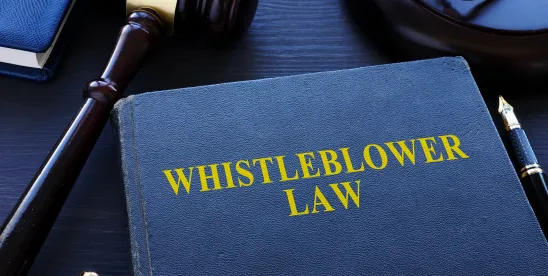In recent weeks, a number of U.S. Attorneys’ Offices (USAOs) across the country have rolled out “Whistleblower Pilot Programs” offering the potential of non-prosecution agreements in exchange for voluntary self-disclosure of criminal conduct by participants in non-violent offenses. These “whistleblower” programs, announced within the same timeframe as the Department of Justice’s new Corporate Whistleblower Awards Pilot Program, can sow confusion among would-be-whistleblowers as well as attorneys and pose significant risks to corporate informants as these Pilot Programs differ greatly from other well-known corporate whistleblower programs, such as the Securities and Exchange Commission (SEC) Whistleblower Program.
While the USAO Pilot Programs recognize the importance of corporate whistleblowers and are a positive step away from prosecuting whistleblowers, they fail to incorporate the proven incentives that have made other whistleblower programs so successful. By failing to direct potential informants towards these other whistleblower programs, such as the SEC Whistleblower Program or AML and Sanctions Whistleblower Program, which pay monetary awards and afford whistleblowers anonymity as incentives for coming forward, the USAO programs may lead whistleblowers astray.
Whistleblowers thinking about making a disclosure to a USAO whistleblower program should thus consult with an experienced whistleblower attorney to determine the best path for making a disclosure.
Proliferation of USAO “Whistleblower” Programs
In January, the U.S. Attorney’s Office for the Southern District of New York (SDNY) was the first Office to create a “whistleblower” pilot program with the Northern District of California (NDCA) following suit in March.
In September, a number of other USAOs unveiled their own programs, including the District of New Jersey, Eastern District of Virginia, District of Columbia, Southern District of Florida, Eastern District of New York, Western District of North Carolina, and Northern District of Illinois, among others.
The central premise of these “whistleblower” Pilot Programs is that the USAO will enter into a non-prosecution agreement (NPA) with individuals who voluntarily enter the program, agree to fully cooperate with an investigation into the wrongdoing they are alleging and meet a number of strict criteria.
The type of misconduct targeted by the programs differ slightly, but in general they align with the description first put forward by the SNDY: “criminal conduct undertaken by or through public or private companies, exchanges, financial institutions, investment advisers, or investment funds involving fraud or corporate control failures or affecting market integrity, or criminal conduct involving state or local bribery or fraud relating to federal, state, or local funds.”
Notably, the program’s explicitly do not cover violations of the Foreign Corrupt Practices Act (FCPA) which is covered by the SEC Whistleblower Program. This care-out is not clearly stated as it is in a footnote.
The exact criteria for each program differs, but most of the programs require the following, as laid out in the SDNY policy:
- “The misconduct has not previously been made public and is not already known to the United States Attorney’s Office;
- The individual discloses the criminal conduct voluntarily and not in response to a government inquiry or obligation to report misconduct;
- The individual is able to provide substantial assistance in the investigation and prosecution of one or more equally or more culpable persons, and is prepared to cooperate fully with this Office in its investigation and prosecution of the disclosed conduct;
- The individual truthfully and completely discloses all criminal conduct in which the individual has participated and of which the individual is aware;
- The individual is not (a) a federal, state, or local elected or appointed and confirmed official; (b) an official or agent of a federal investigative or federal law enforcement agency; (c) a person who otherwise is, or is expected to become, of major public interest; or (d) the chief executive officer or equivalent or chief financial officer or equivalent of a public or private company; and
- The individual has not engaged in any criminal conduct that involves the use of force or violence, any sex offense involving fraud, force, or coercion or a minor, or any offense involving terrorism or implicating national security and does not have a previous felony conviction or a conviction of any kind for conduct involving fraud or dishonesty.”
The programs also allow for the USAO to discretionarily offer a NPA to individuals who do not meet all the criteria when doing so “would be in the public interest and necessary in the particular case.”
Confusion and Risks to Whistleblowers
While broadly similar, each of these USAO Pilot Programs has published its own policy, creating a splintered and confusing landscape for whistleblowers to navigate. But even more troubling is the way these programs may be confused for whistleblower award programs set up by the DOJ and other agencies.
By referring to these programs as “whistleblower programs” the U.S. Attorney’s Offices create the false impression that these programs are akin to the widely publicized corporate whistleblower programs, including the SEC Whistleblower Program, CFTC Whistleblower Program, AML and Sanctions Whistleblower Program and IRS Whistleblower Program. Most notably, these USAO “whistleblower programs” will likely be confused with the newly created DOJ Corporate Whistleblower Awards Pilot Program, which is another pilot whistleblower program that was announced by the DOJ in the same timeframe as the NPA programs.
The prospect of confusion poses significant risks to whistleblowers as the USAO programs differ greatly from the United States government’s other corporate whistleblower programs.
The first risk posed is the complete discretion granted to the USAO’s in reaching determinations about whistleblower eligibility. There is no guarantee that a whistleblower will satisfy all the eligibility criteria in the eyes of the USAO and there is no avenue to appeal a decision.
Furthermore, unlike the Dodd-Frank whistleblower programs, these USAO programs do not allow for anonymous reporting. While some of the USAOs, such as the SDNY, note that “at least in the first instance, individuals can provide information anonymously, either directly or through counsel” they clarify that the office “will ultimately need to know the individual’s identity.”
Anonymity is the most important anti-retaliation protection offered to whistleblowers and individuals who enter one of the USAO programs risk having their identity publicized.
Lastly, unlike the other corporate whistleblower programs, whistleblowers are not eligible for monetary awards under these USAO Whistleblower Pilot Programs. While participation in a USAO Pilot Program and participation in a statutorily created whistleblower award program that mandates granting whistleblower anonymity and payment of awards, are generally compatible, whistleblowers risk losing their eligibility for awards by first contacting a USAO and not promptly filing an official disclosure with another corporate whistleblower award program.
Notably, under the SEC Whistleblower Program’s related action provisions, whistleblowers may be eligible for awards based on enforcement actions taken by the DOJ Criminal Division in instances where the information they provided to the SEC was used by both the SEC and DOJ in successful enforcement actions. However, if a whistleblower simply goes to one of these USAO programs and does not file with the SEC they will likely be ineligible for an award.
While certain USAO’s have a FAQ explaining that “is not uncommon for individuals to report a crime to another agency’s whistleblower program, in addition to [the USAO] program” they generally do not direct whistleblowers towards other programs which offer stronger protections and incentives.
Even experienced defense attorneys who may represent corporate insiders who may want to participate in a USAO Whistleblower Pilot Program and request a NPA can be led astray and may not be experienced in representing whistleblowers who want to report violations and seek monetary awards in the well-established SEC, CFTC, FinCEN or IRS whistleblower programs. That is why it is critical for both corporate whistleblower insiders and attorneys who may be advising them on potential criminal liability to seek advice from an experienced whistleblower award attorney before entering the USAO Whistleblower Pilot Programs.
Conclusion
Overall, whistleblowers should be cautious about these USAO whistleblower programs. They should always look to file with other well-established whistleblower award programs that offer monetary awards and anonymity first and they should consult with an experienced whistleblower attorney before moving forward and contacting a USAO.
Meanwhile, the DOJ needs to look into better integrating its processes with the hugely successful corporate whistleblower programs administered by other agencies as well as its own newly created whistleblower award program.





 />i
/>i
